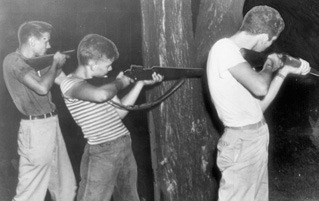5 Uprisings Cut from U.S. History for Being Too Successful

Overthrowing a government takes an enormous amount of planning, strategy, and resources. You need political allies, troops, a new staff to fill all the bureaucratic roles and keep the system running smoothly after the takeover -- it's a matter of years, if not decades, of work. Of course, you could also waltz right into the capitol building, unzip your pants, and say: "Yep, this whole state is aaaalmost big enough to hold my balls." You know, like these folks did ...
A Delusional Vice President Tries to Conquer Half of North America and Create His Very Own Empire

Vice President Aaron Burr, that guy who killed Alexander Hamilton in a duel, is best remembered as "that guy who killed Alexander Hamilton in a duel." His political career unsurprisingly collapsed after that one itty-bitty little homicide, but Burr wasn't ready to update his LinkedIn profile just yet, so he decided to create his own country to govern. This, obviously, implied huge steaming mounds of treason.

Never trust a man who wears those creepy little Dracula glasses.
Burr traveled to Philadelphia and offered his services to Anthony Merry, British minister to the United States. He wanted to help Great Britain establish an independent "Empire of the West." How? By taking over the Louisiana territory, which, at the time, amounted to more than half of the U.S. -- and, hell, why not Mexico to boot? Mexico was then a Spanish territory and included what is now Texas, California, and the rest of the Southwestern United States. Hey, if you're gonna piss off an entire country, might as well go double or nothing, right? Merry was down to internationally clown, but British Prime Minister Charles James Fox thought the plan might be "super crazy. Like, even for a guy that shoots people for calling him 'voluptuary' -- that's crazy."

Pictured: Aaron Burr committing political suicide.
Not Pictured: The worst thing he did that year.
After the British bailed, Burr decided to press ahead regardless. He procured himself a riverboat and set off down the Ohio River, at which point he realized that, shit, he didn't have an army (pretty much the first item on any "build an empire" checklist). So, on his way to New Orleans, he started recruiting any and every settler he encountered to his cause.
Unsurprisingly, it didn't take long for word of Burr's shenanigans to reach President Jefferson, who immediately ordered him arrested. Quite surprisingly, in the ensuing trial Burr was found not guilty -- partly due to Jefferson's refusal to appear in court, and partly because U.S. Chief Justice John Marshall thought Jefferson was sort of an asshole.

"I hate his face more than I love this country, sorry."
After his acquittal, Burr changed his name and fled to Europe, where he spent the next few years unsuccessfully attempting to garner support for his plan to conquer Mexico. Say what you will about Burr -- delusional, murderous, kinda looks like the telescope-gnome from The NeverEnding Story -- but the man persevered ...
... at treason.
A Gubernatorial Election Kicks Off a Mini Civil War

Following the Civil War, the United States went through an era of Reconstruction, during which, to put it politely, shit went fuck-all crazyballs. Take the Brooks-Baxter War, which kicked off when two gubernatorial candidates couldn't agree on who had won the pleasure of leading Arkansas through possibly the worst period in its history.

Like Game of Thrones but moonshinier and with more possible inbreeding.
Elisha Baxter and Joseph Brooks were opposing candidates in the 1872 Arkansas election. No one's quite sure who won the election due to widespread voting irregularities. But Baxter's backers controlling the voting process might have had a little something to do with that.
Confident that he had won -- hey, cheating is a type of winning -- Baxter declared himself governor. Brooks, meanwhile, also declared himself governor. Brooks then gathered up the sheriff and a group of armed cohorts and stormed the state house, expelling Baxter to a nearby hotel. Baxter called in a militia. Brooks also called in a militia, and then one-upped Baxter by rolling two six-pounder artillery cannons onto the capitol lawn. Baxter, in turn, brought out a 26-pounder and pointed it in the general direction of the state house. Yes, post-Civil War politics were a lot like a Loony Tunes sketch.

There's no record on if they started dressing in drag to try to seduce each other.
Over the next five days, men streamed in on either side, until they had each built up an army of around 1,000 troops. Finally, after a month of old-timey dick-waving, President Grant sent in the military and issued his proclamation: Baxter was the true governor, presumably because they busted out the measuring tape and determined, once and for all, that he had the biggest cannon.
The British Almost Fly a Maple Leaf Over Maine

During the War of 1812 -- which had a serious branding problem, since the bulk of the fighting took place in 1814 -- ships teeming with redcoats barreled into the coast of not-yet-Maine with the intention of teaching it some proper British manners, preferably via horrific force. Sadly, the ol' imperial ultraviolence wasn't to be -- British troops found the place basically empty (what, Maine? You don't say!) and quickly overran the place.

Flawless Victory.
Within weeks, the entirety of Eastern Maine was under British occupation, and it almost certainly would have been annexed to Canada if the U.S. hadn't managed to turn back the massive invasion of New York on Sept. 11, 1814 (New York's beef with that particular date goes way back). Even after the war ended, Massachusetts couldn't be assed to reclaim the parts that would eventually become Maine from the British. It took over three years for them to finally withdraw of their own accord, once they realized it was Maine.

"Our home sucks so bad we keep stealing other countries to live in, and even we don't want this shit hole."
A Small Band of Armed White Dudes Overthrows the Kingdom of Hawaii

Once upon a time, Hawaii was its very own sovereign nation, complete with its very own king. It also had a very influential community of white immigrants who weren't in power. That situation generally does not bode well for the folks with a bit more melanin. This was the legislative representative from Kauai under the Hawaiian Kingdom, Sanford B. Dole:

Dude just screams "Hawaiian."
He and the rest of his bifurcated beardmates had a bit of a sweet tooth: They really, really liked sugar. Enough to overthrow a kingdom for it, in fact. Toward that end, they formed the Hawaiian League, a group of around 400 Americans backed by the Honolulu Rifles, a small volunteer militia. In 1887, the group stormed the royal palace, woke King Kalakaua, and asked him to sign what became known as the Bayonet Constitution (that's how you politely threatened to stab a dude, back in the day).
The new constitution essentially reduced the king to a figurehead, but they weren't done yet: In 1891, King Kalakaua died of kidney failure, and the (now largely symbolic) throne passed to his sister, Queen Liliuokalani. By early 1893, Liliuokalani was making strides toward restoring the power of Hawaii's monarchy. But this time Dole and company had the full support of the United States in the form of the warship USS Boston, which was conveniently in port at Honolulu Harbor.

It's funny how these things work out.
Just after the queen unsuccessfully proposed her new constitution to the Hawaiian legislature, 162 armed troops came ashore from the Boston, marched right in front of the royal palace, and set up camp. They were officially there to "protect American lives and property" during the possible fallout from the ongoing political turmoil, but that's kind of like a pro wrestler lugging a folding chair into a match and saying it's there "in case he gets tired."
Dole's supporters went straight to work, swiftly establishing a provisional government and plopping Dole firmly in the president's chair. Queen Liliuokalani surrendered Hawaii's sovereignty under the misguided assumption that the American government would ultimately restore her throne, and the path to annexation and eventual statehood was thereby set in stone, ensuring that the mainland American populace would forever have a really expensive place to vacation.

Plus, where would American supervillains build their hideouts without volcano islands?
Pissed-Off WWII Veterans Lay Siege to Athens, Tennessee

Paul Cantrell was a three-time sheriff and two-time state senator from McMinn County, Tennessee, who always aspired to be a cliche movie villain. He had the brilliant idea to pay the county's deputies based on their number of arrests. That wasn't a well-meaning but poorly thought out initiative on Cantrell's part; he had deputies wait at bus stops to literally nab everyone who got off. One of those people was Bill White, a World War II veteran who was mere minutes away from returning home after spending a few years gutting the Japanese war machine.
This angered the veterans.

An artist's representation.
In the 1946 election, Cantrell found himself running against the G.I. Non-Partisan League. Hundreds of Cantrell's armed deputies showed up at the voting stations, arrested all the civilian poll watchers and any watching WWII veterans, then beat up an elderly black man with brass knuckles and shot him in the back as he ran away. Short of cutting him a paycheck, that's the surest way we know to get Van Damme to show up in your town.
Unfortunately for Cantrell, those WWII vets he arrested earlier were WWII vets. They weren't about to let him get away with these shenanigans. When Cantrell shut down the polls early and took the ballots under armed guard to the local jailhouse (his usual spot for rigging the vote), White had the G.I.s raid a goddamn federal arsenal and follow him. Once there, White yelled: "Would you damn bastards bring those damn ballot boxes out here, or we are going to set siege against the jail and blow it down!"

Which is really a more effective threat than promising to "huff and puff."
By that time, anti-Cantrell riots had broken out all over town. The governor of Tennessee considered calling in the National Guard to suppress the revolt, but he realized that since the National Guard was mainly WWII veterans, they'd probably just join in. The siege ended when someone decided to make good on White's threat and blow up the jail with dynamite. The crooked cops surrendered and were locked up for the night. Cantrell fled the county, and after an official count, the G.I. candidate was certified as the legitimate winner. The G.I.s cleaned their stolen rifles and put them back in the federal arsenal before daybreak, and then fixed the jail. This is the South we're talking about, after all -- a total revolt is no excuse for rudeness.
Zachary William Frey the First is currently a student at Greenwich High School, and you can read all his other crazy articles and (not) be his friend here.
For more mini coups, check out 5 Lesser Known (Completely Ridiculous) American Civil Wars and 5 Forgotten Revolutions That Created The Modern World.
Are you on reddit? Check it: We are too! Click on over to our best of Cracked subreddit.
Spread some revolutionary ideas, click the Facebook 'share' button below. Don't worry: it's light treason at worst.
